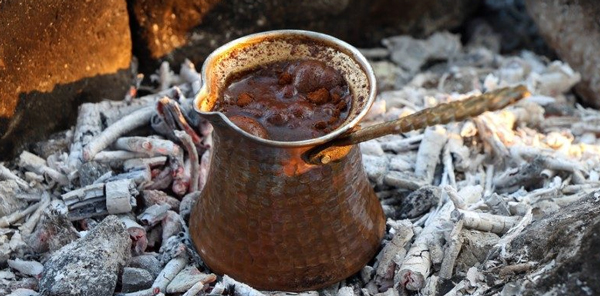Turkish Coffee: Traditional Taste

Turkish Coffee, which is among the most important flavors of Turkish cuisine, has survived from the Ottoman Empire to the present day. This Coffee, which is known for being cooked on the stove, on embers, and in the sand, also attracts the tourists coming to our country. Turkish Coffee, which served with Turkish delight and chocolate, is beneficial for health when consumed regularly. When multiple benefits added to its taste and pleasure, it has become one of Turkey’s most preferred hot drinks.
How is Turkish Coffee Served?
 It is a ceremony with Turkish coffee brewing, cooking, presentation, and even fortune-telling. Before cooking the Coffee, the equipment completed with special cups and coffee pots, ‘how do you drink your coffee’ asked: some plain, some with medium sugar. When low sugar and sugar added, the options increase to more than four. In addition to the amount of sugar, the hardness of the Coffee can adjust with different roasting techniques and degrees. In other words, it is served to suit all tastes.
It is a ceremony with Turkish coffee brewing, cooking, presentation, and even fortune-telling. Before cooking the Coffee, the equipment completed with special cups and coffee pots, ‘how do you drink your coffee’ asked: some plain, some with medium sugar. When low sugar and sugar added, the options increase to more than four. In addition to the amount of sugar, the hardness of the Coffee can adjust with different roasting techniques and degrees. In other words, it is served to suit all tastes.
Traditionally, Coffee, cooked in a low-heat copper pot with plenty of foam, is usually consumed with Turkish delight and water. In addition, it is pretty compatible with natural mineral water. So, you can serve according to your taste.
Benefits
- Drinking Coffee regularly reduces the risk of colon and colon cancer by 25% and bowel cancer by 45%.
- It provides energy to the body to stay awake.
- A cup of Turkish Coffee after the meal provides relief in digestion.
- It is suitable for stomach and weight problems when drunk without sugar.
- Turkish Coffee also positively affects the power of thinking. It also reduces the risk of Alzheimer’s when consumed regularly.
- Since it has an exciting feature, it makes the brain more receptive to signals.
- It lowers cholesterol and protects cardiovascular health.
- It reduces the risk of breast cancer.
- Turkish Coffee provides a 40% pain relief effect.
- It helps prevent Parkinson’s and diabetes.
- The product reduces the effects of depression, relieves stress.
- It reduces the risk of pancreatic cancer.
How Many Cups of Coffee Should You Drink Per Day?
As with any product, excessive consumption of Coffee is also harmful. To benefit from the benefits of Turkish Coffee, it recommended to consume it in moderation. Drinking 2 cups of Turkish Coffee a day is ideal. When more than 2 cups consumed, its harmful effects begin to appear.
Spit coffee does not cause any side effects when consumed in moderation. But if more than 2 cups consumed, disruptions in heart rhythm occur. It also causes stomach problems, triggers headaches and muscle aches. Excessive coffee consumption also has adverse effects on blood pressure. It also causes insomnia.
History of Turkish Coffee
 The discovery of Coffee based on various rumors. According to what is told, the arrival of coffee to us was during the reign of Suleiman the Magnificent. In 1543, coffee came to Istanbul by ships for the first time. Of course, his arrival was a big event. It was introduced and spread by dervishes. It started to be drunk in mosques as an integral part of religious ceremonies. Coffeehouses opened in the city centers.
The discovery of Coffee based on various rumors. According to what is told, the arrival of coffee to us was during the reign of Suleiman the Magnificent. In 1543, coffee came to Istanbul by ships for the first time. Of course, his arrival was a big event. It was introduced and spread by dervishes. It started to be drunk in mosques as an integral part of religious ceremonies. Coffeehouses opened in the city centers.
However, after that, drinking coffee, which became addictive, was forbidden by the clergy. Even the sheik al-Islam of the period said, “It is not permissible to eat and drink an object that is roasted and burned until it turns into charcoal” and sunk the ships bringing coffee into the sea with their cargo. Of course, as everything banned, coffee eventually created passion. Bans also succumbed to this passion. In 1554, Hekim brought coffee to Istanbul from Aleppo, and someone named Şemsi from Damascus. A shop opened in Tahtakale, and coffee was cooked and sold to the public.
However, until the end of the 19th century, Turkish Coffee was always sold as raw beans, roasted at home, and ground in hand mills. In 1871, Mehmet Efendi took over the spice and raw coffee shop from his father. And for the first time in that history, he started to grind Coffee in mortars and sell it ready-made. And to this day, the tradition of roasted and ground Turkish Coffee continues; This exquisite priestess is passed from generation to generation with the same ceremony.


